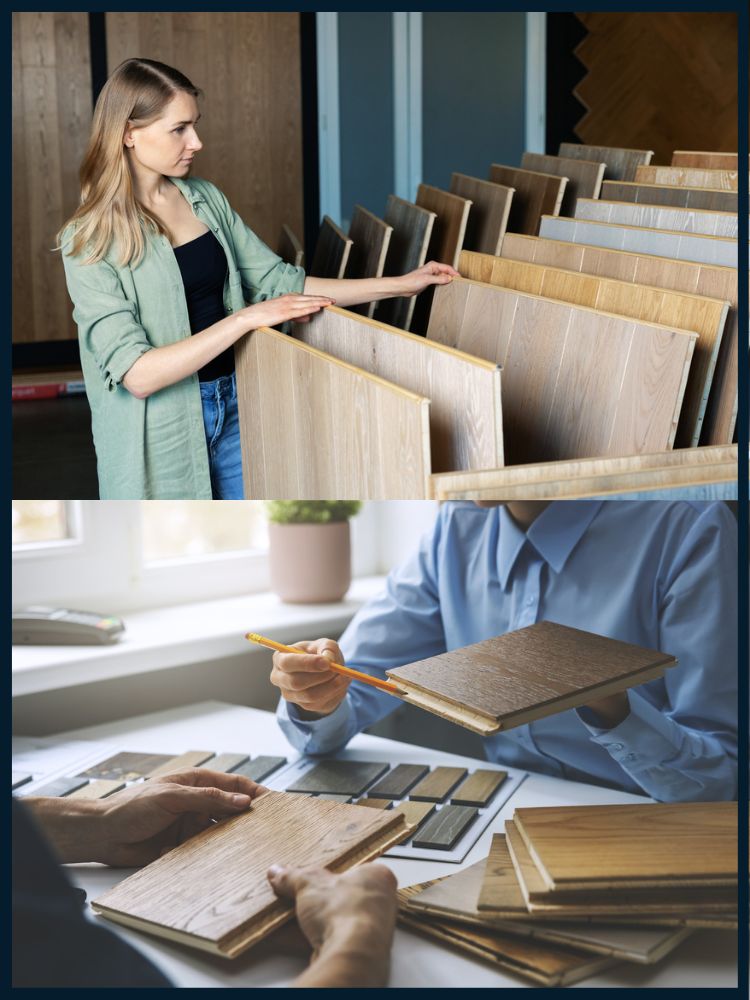We may earn revenue from the products available on this page and participate in affiliate programs. Learn More ›
Whatever your home’s style may be, flooring is quite literally its foundation, and often the first design element visitors notice when they step inside. Luckily for homeowners getting ready to install new flooring, today’s choices are vast. Two flooring options are particularly popular these days, appreciated for both their warm appearance and value-boosting powers: laminate wood and the real McCoy, hardwood.
Though they may look similar, each one has its pros and cons. Learn more about comparing laminate vs. hardwood flooring to determine which is best for your home and lifestyle before you make this significant, long-term investment.
Nothing beats the look of real hardwood flooring.

Hardwood floors have been bringing natural beauty to interior spaces for centuries. Available in nearly endless textures, colors, and finishes, this flooring option offers an organic ambience absent in many of today’s manufactured materials. Purists swear by its warmth and refinement, and its mere presence can have a positive effect on a home’s resale price.
Laminate flooring has come a long way since its debut.
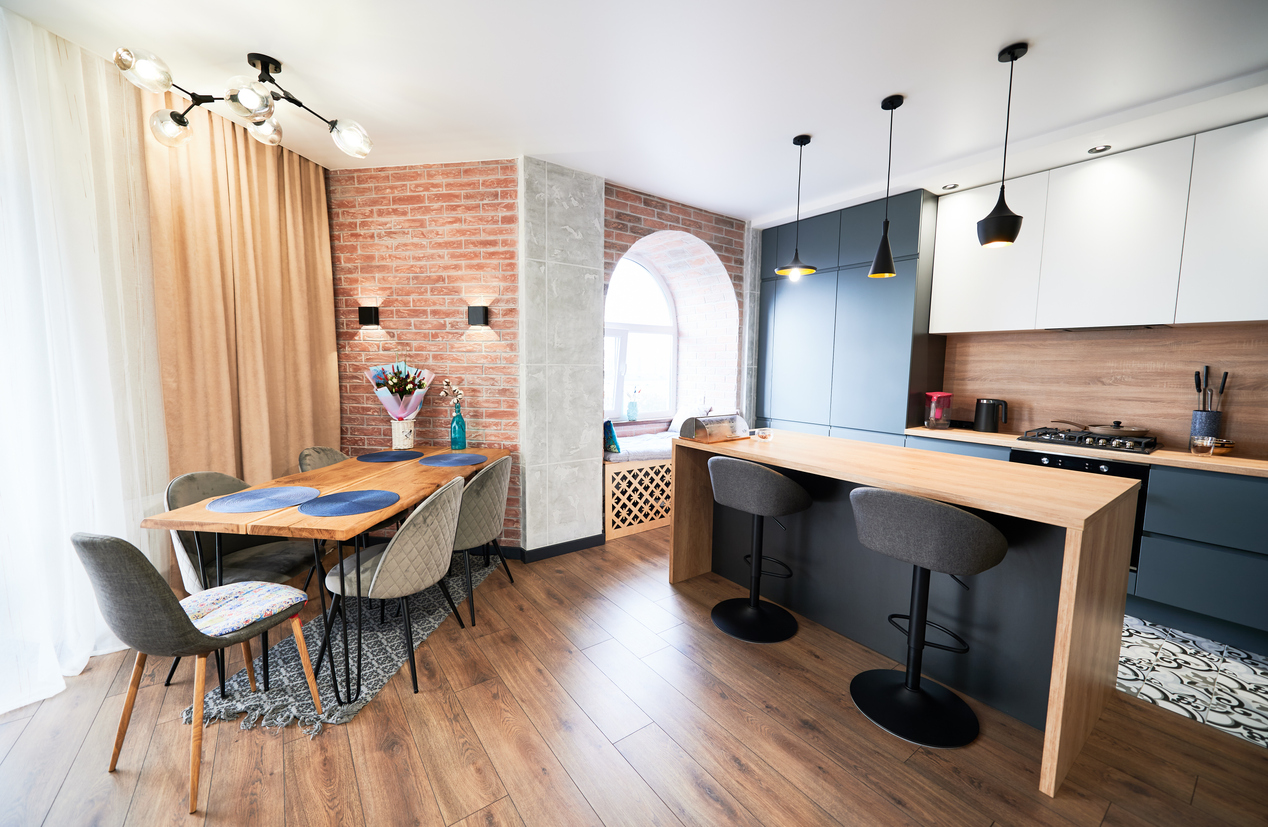
There are many more types of laminate flooring available today than your parents were able to choose from. Laminate floors are engineered to approximate the look of natural materials—wood as well as stone. The essential technology dates back to the 1920s, with the development of compressed wood and lamination industries, although early household laminates were used primarily as countertops.
Laminate flooring was introduced in the 1970s and took off thanks to its durability and affordable price point. Versatile and long lasting, laminate remains a popular flooring option that continues to improve in quality, appearance, and variety.
Laminate flooring is more scratch-resistant than most hardwood flooring.
Wood-look laminate flooring boasts UV protection and resists scratches and dents, so it is perfect for placement in high-traffic and sun-drenched areas. Today’s laminates can hold their own in hardwood vs. laminate comparisons of durability and style. In fact, their appearance has come so far in recent years that it can be hard to distinguish some laminates from their natural inspiration.
Hardwood flooring ages more quickly than laminate flooring.
Beloved by interior designers, historians, nature lovers, and anyone who appreciates fine craftsmanship, hardwood flooring imbues a space with an enduring quality, thanks to its long history in home building. Homeowners who swear by hardwood’s character refuse to settle for anything less, particularly when they’re remodeling an older home. But the same organic attributes that lend warmth and character to hardwood can be a turnoff for some—specifically, the way that long-term wear and tear ages wood.
Unlike laminate, hardwood reacts to intense sunlight and is sensitive to high-heeled shoes, pets, kids, and furniture, all of which can dent and scrape the wood. Over time, this translates into a rustic appearance that some admire but others view as shabby or tired.
Laminate flooring costs half the price of hardwood flooring.
Cost is easily the biggest selling point of laminate flooring; it typically runs about half the price of hardwood. Before you spring for the best-priced laminate you can find, however, bear in mind that lower-quality (which usually means cheaper) laminate often looks less realistic. So, as you’re weighing your options, remember the old adage: You get what you pay for.
Installation costs for laminate flooring are also lower than those of installing hardwood floors.

Laminates do offer a bonus for handy homeowners: While some hardwood floors are being tailored for the DIY market, laminate, which is considered simpler to install, has long been viewed as the go-to DIY option. Once the underlayment and/or vapor barrier have been installed, laminate can be popped into place with (depending on the product) tongue-and-groove or snap-and-lock edges, making it a fairly straightforward weekend project.
Hardwood flooring is available in a wide range of sustainable options.
Hardwood also holds appeal for remodelers who are interested in environmental sustainability. It’s been more and more popular in recent years to use reclaimed wood when building or remodeling a home; transferring rescued construction materials to new structures or applications can give a place a built-in sense of history. Eco-conscious renovators can also purchase new lumber that has been certified by the Forest Stewardship Council (FSC), which ensures that the wood has been harvested in an environmentally responsible manner.
Cleaning laminate wood flooring has everything to do with knowing what not to do to it.
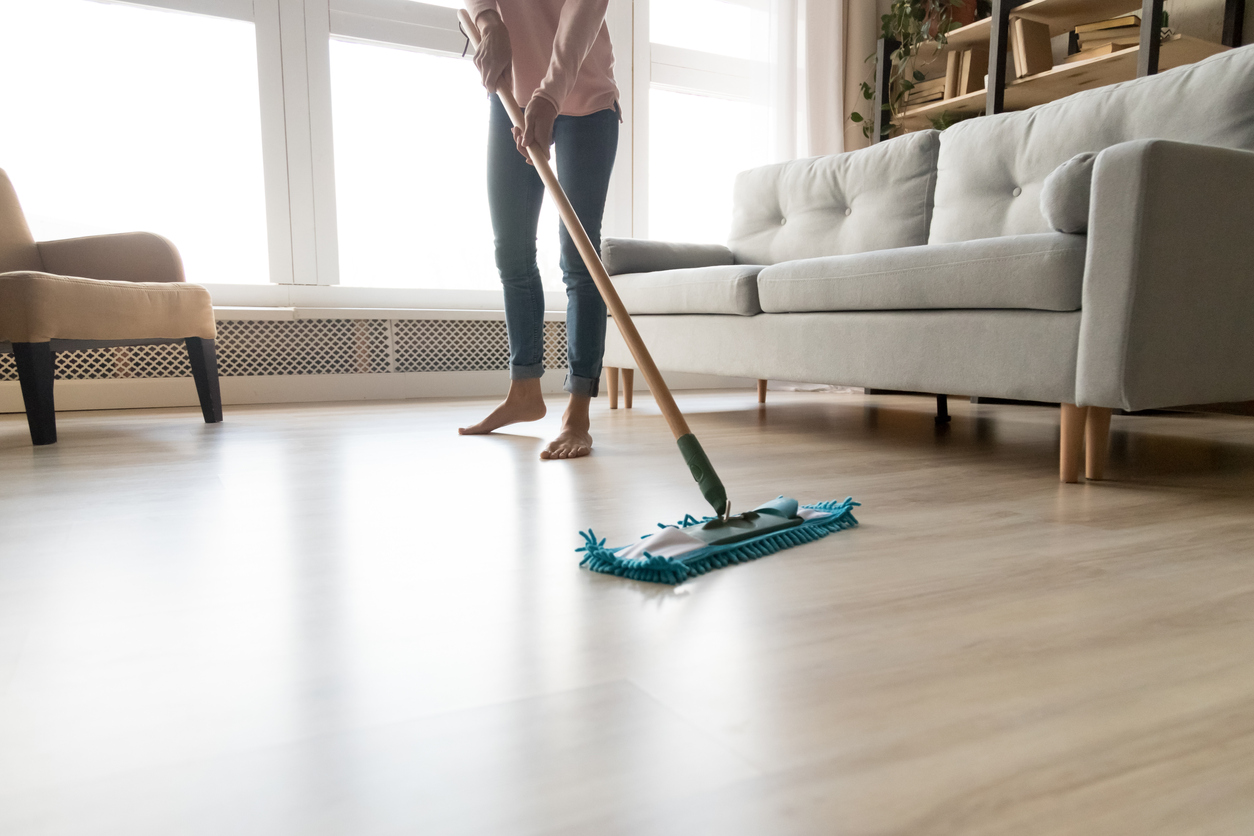
Laminate is generally simple to maintain, but it’s important to know what not to do. Avoid all detergent-based cleaners, which leave a dull film behind when they dry. Likewise, waxes and abrasives can build up residue and compromise the smoothness of the surface. Instead, in tandem with regular sweeping and vacuuming, use a store-bought laminate cleaner. Position mats at exterior entrances to catch incoming dirt, and always clean up spills quickly to help extend your laminate’s lifespan.
RELATED: The Best Mops for Laminate Floors
Hardwood floors require regular cleaning that’s specific to your floor’s finish.
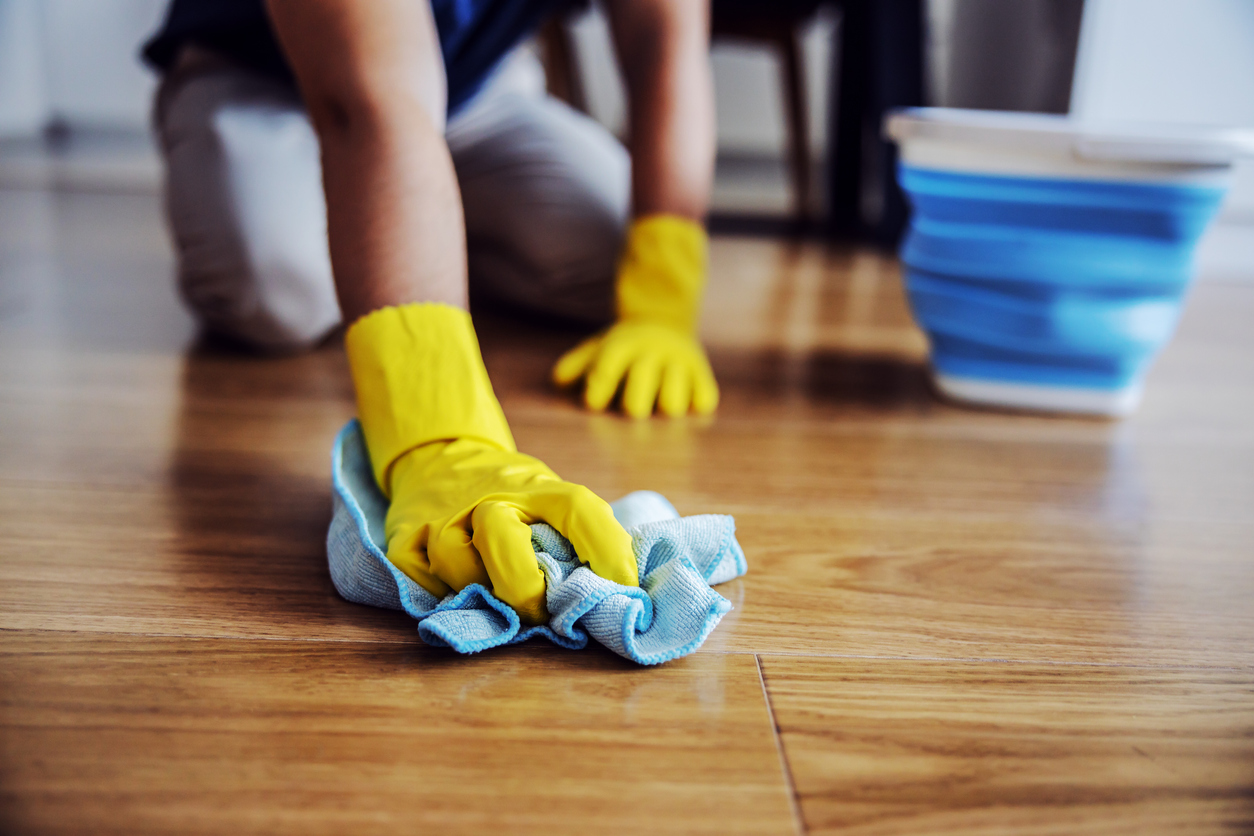
Keeping hardwood floors from aging faster than the rest of the house requires a little TLC, including regular sweeping and using both an all-purpose, no-wax wood cleaner and a restoring agent that’s appropriate for the floor’s finish. A wax finish can be revived with additional wax, for example, but it’s not a good idea to use wax on varnished or polyurethane-finished wood. Before using any restoring agent, make sure it’s made specifically for your type of flooring.
Given how sensitive hardwood flooring is to sunlight, scratches, dirt, and debris, it’s wise to take measures beyond a regular wipe down to care for it. Start by setting out mats and runners near exterior doors to keep dirt and moisture from being tracked onto the floor. Apply protective pads to furniture legs, keep pets’ claws trimmed, and avoid wearing high heels to prevent denting and scratching.
A good measure of high-quality laminate flooring is the floor’s abrasion class rating and the thickness of its core.
When shopping for high-quality laminate flooring, it’s crucial to understand that not all laminate flooring is equally good at resisting marks and scratches. Laminate flooring comes with abrasion ratings that determine just how much abuse the surface can take. Ratings range from abrasion class AC1 to AC5. AC1 is the most susceptible to wear, so it is suitable for low-traffic areas in the home, whereas AC3 is a good choice for high-traffic areas, such as kitchens and entryways. AC5 laminate flooring, which has the maximum scratch and dent resistance, is reserved for commercial use.
Thickness is also another important consideration when shopping for laminate flooring. A good-quality laminate flooring will range in thickness from 7 millimeters (mm) to 12 mm. While thicker flooring will have better soundproofing qualities, thickness does not impact durability. Refer to a laminate flooring’s AC rating as you weigh its durability.
Hardwood is not water-resistant wood flooring—laminate is better for damp locations.
While hardwood flooring may be more durable than laminate flooring, there are certain high-traffic areas in the house in which laminate flooring performs better. Water from spills, showers, and leaky appliances can easily damage hardwood flooring. While laminate is not impervious to water damage, it does a much better job of holding up against moisture because it has a water-resistant layer and underlayment. For this reason, laminate flooring is a much better choice for kitchens and bathrooms than hardwood flooring.
When it comes to valuing a home, installing hardwood flooring is a better return on investment than installing laminate.
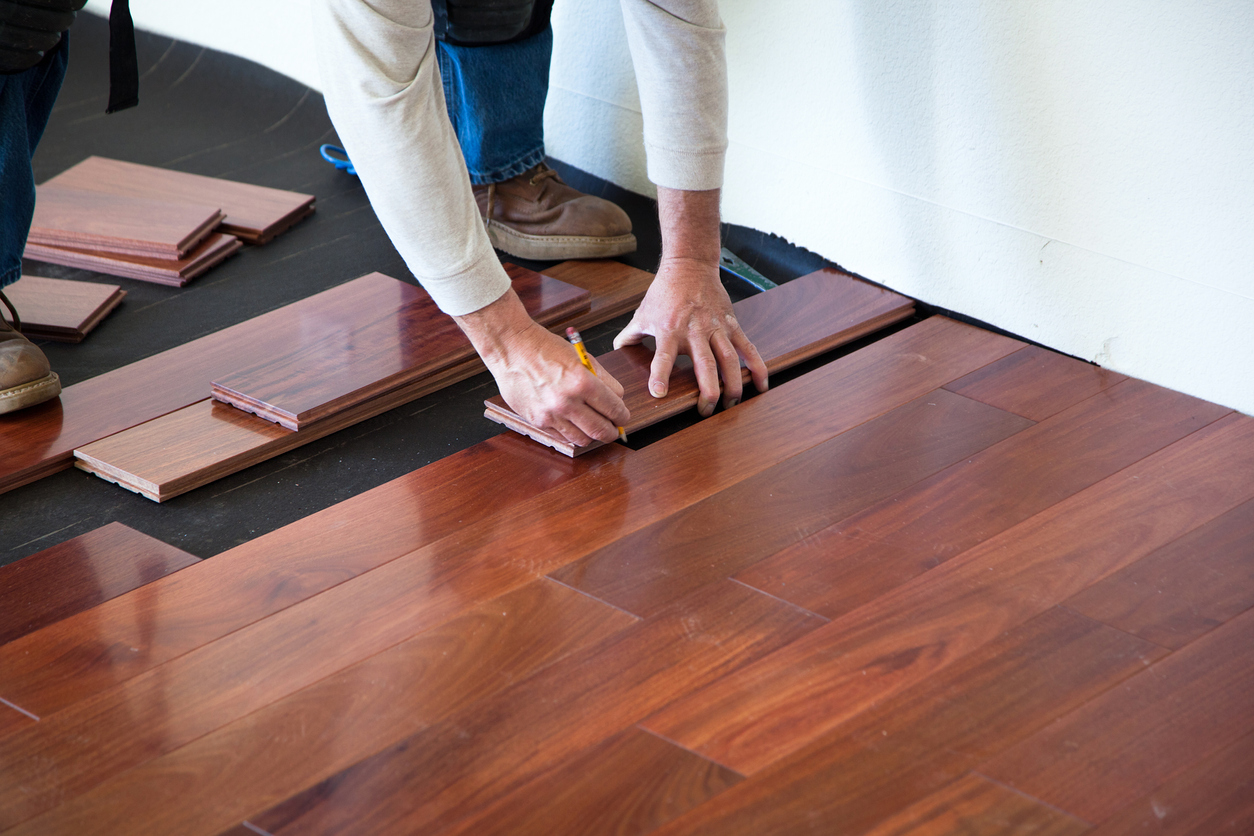
Real hardwood flooring will always trump laminate flooring when it comes to adding value to a home. As long as the flooring is in good condition, you can expect a 70 percent to 80 percent return on your investment when selling the home. While laminate flooring will increase the value of the home over traditional carpeting or linoleum, it won’t match the high rate of return you can expect from a real hardwood floor.
Final Thoughts
Deciding between laminate vs. hardwood largely comes down to preference and budget. Hardwood flooring has the look and feel of real wood that laminate can mimic but can’t match, so hardwood is a good choice for purists who don’t mind paying extra for it. And, while hardwood can wear more quickly than laminate, it is possible to refinish it at a much lower cost than replacement, whereas laminate must be replaced once it is worn out.
Laminate, in comparison, better resists scratches, dents, and water damage and is much more affordable from the start. And, high-end laminate features embossed technology that very closely imitates the look of real wood. These qualities make laminate a great choice for high-traffic areas, and for homeowners who want to add the look of hardwood flooring on a budget.
FAQs
If you’re wondering about the price difference between laminate and hardwood and how easy it is to tell the difference between the two, read on to learn more about comparing and contrasting these two popular types of flooring.
Q. How much more expensive is hardwood than laminate?
The cost of hardwood floors and laminate products varies based on quality. Generally speaking, the harder the wood used to make the hardwood flooring, the more expensive it is. The average cost of wood flooring is $11.50 per square foot and ranges between $8 and $15 per square foot.
In comparison, the average cost of laminate flooring is $7 per square foot and ranges from $3 to $11 per square foot, depending on thickness and AC rating. Laminate is much easier to install than hardwood, so expect to pay about 50 percent less to have laminate installed compared to hardwood.
Q. How can you tell laminate from hardwood?
Advancements in embossing technology have given some laminates a hardwood texture. Coupled with wood grain designs that don’t repeat, the technology that goes into high-grade laminates can make the flooring look very similar in appearance to real wood. Telltale signs of real hardwood are dents and scratches, which you won’t typically find on laminate. Hardwood may also have nails and staples near the walls and in corners where it’s not possible to use a flooring nailer that hides the nails from view.
Q. Which lasts longer, hardwood or laminate?
Hardwood floors can last much longer than laminate, which is typically limited to a lifespan of between 15 and 25 years. That said, hardwood flooring will usually show wear and tear more much quickly than laminate due to its susceptibility to scratches, dents, and discolorations. However, since hardwood is solid wood that can be up to ¾ inch thick, it can be sanded and refinished multiple times to look like new.
Q. Are laminate floors good for kitchens?
Laminate flooring is a great choice for kitchens due to its durability. Laminate resists scratches and dents, excellent qualities for this high-traffic part of the home. More importantly, laminate flooring naturally resists water and is installed with an underlayment that blocks moisture, minimizing potential water damage from spills and constant overspray from the kitchen sink.
Q. Is laminate flooring waterproof?
While laminate flooring resists water damage in bathrooms and kitchens, it is not waterproof. Spills that are left to sit and any other standing water left on the floor will eventually damage it. If you’re looking for waterproof flooring, consider vinyl.

